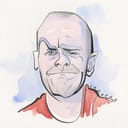Stay in the Loop
BSR publishes on a weekly schedule, with an email newsletter every Wednesday and Thursday morning. There’s no paywall, and subscribing is always free.
What hath Oscar wrought?
In Conversation at the Lantern: Wild(e) Modern Celebrities

The 2016 New Hampshire primary is taking place today, and a buffoon with a bleached blond comb-over is one of the frontrunners for the Republican presidential nomination. Donald Trump’s qualifications for that office don’t include political experience — he has none — or success in the business world — his wheeling and dealing have yielded less of a return than if he’d invested in an index fund, and he’s got four bankruptcies on his résumé.
What he brings to the debate stage is a persona: a brand that he has created through decades of self-promotion and expanded from New York-area notoriety to national awareness through his sideline as a reality TV character. How have we ended up in a world where Trump is being taken (more or less) seriously as a candidate for president of the United States? How — and when — did an individual’s persona come to outweigh his or her actual accomplishments?
In a panel discussion last week, four experts traced the cult of celebrity back to Oscar Wilde, subject of Lantern Theater’s current production, Oscar Wilde: From the Depths. (Our reviews here and here.) Moderated by the Lantern's associate artistic director, Kathryn MacMillan, the panel brought together Tom Fitzgerald and Lorenzo Marquez of TomandLorenzo.com, a fashion and celebrity blog; Dr. Marylu Hill, director of the Center for Liberal Education and the graduate program in Liberal Studies at Villanova; and Charles McMahon, Lantern artistic director and From the Depths playwright.
First, ditch the brogue
Wilde, the panel agreed, was one of the first public figures to consciously create and present a persona — and, in fact, to do so in advance of creating the work that would be transmitted through the frame of that persona. He learned the basics from his mother, who published poetry under the pen name “Speranza” (her name was Jane, Hill pointed out drily). The minute he arrived at Oxford, Hill said, Wilde dropped his Irish accent and turned himself into a living exemplar of aestheticism. He was well-known beyond his immediate circle both in Oxford and, later, in London, even before he began his successful career as a writer.
The version of celebrity that Wilde created — one tinged with hints of scandal and decadence — served as the template for Hollywood, which was founded, both as a locale and as an industry, a mere decade after Wilde’s 1900 death, Fitzgerald said. The difference is that today’s celebrities — the reality stars, the Twitterati — don’t have any actual accomplishments to back up their personae. Those who have published books rely on ghostwriters (Trump) or eschew text altogether (Kim Kardashian).
A Socratic gadfly
In contrast, behind Wilde’s persona was a great literary talent that he used to present a sophisticated critique of Victorian hypocrisy. “He saw himself as a Socratic gadfly,” Hill said, and his work reflected that: The Importance of Being Earnest was a comedy, but his other plays, though tinged with humor, grappled with the stories of people who keep secrets rather than risk society’s judgment. Keeping secrets was central to Wilde’s own dilemma: He hid both his Irishness, and, of course, his love of men — a love that not only dared not speak its name, but had no name to speak, since “homosexual” wasn’t a meaningful category at that time.
Those elements of darkness and struggle, Fitzgerald said, are present in most successful celebrity personae. He cited David Bowie, who learned how far he could push the envelope, and knew just when to pull back. “He spent the ’70s as an alien,” Fitzgerald said, “then transformed himself into a ’30s German movie star.”
Talent, morality, kindness
Bowie had other things in common with Wilde, beyond this ability to play the fashion game: genuine artistic gifts and a strong moral sense. These traits made these men legends and not just celebrities — and they are also precisely what most of today’s “stars” lack. Another difference between these legends and the merely famous: their kindness. Women, especially, loved Wilde for being such a good listener, Hill said. And when involved in a public battle of the wits — as, for instance, in his famous feud with painter James McNeill Whistler — Wilde would “lose,” because of his refusal to go for the jugular.
This last, clearly, is an attribute that has been jettisoned by the Donald and his ilk.
For Paula Berman’s take on Kim Kardashian and Kanye West, click here.
What, When, Where
In Conversation series at the Lantern: Wild(e) Modern Celebrities. February 1 at the Lantern Theater, St. Stephen's Theater, 923 Ludlow St., Philadelphia. 215-829-0395 or lanterntheater.org.
Sign up for our newsletter
All of the week's new articles, all in one place. Sign up for the free weekly BSR newsletters, and don't miss a conversation.

 Judy Weightman
Judy Weightman
 Illustration by Mike Jackson
Illustration by Mike Jackson